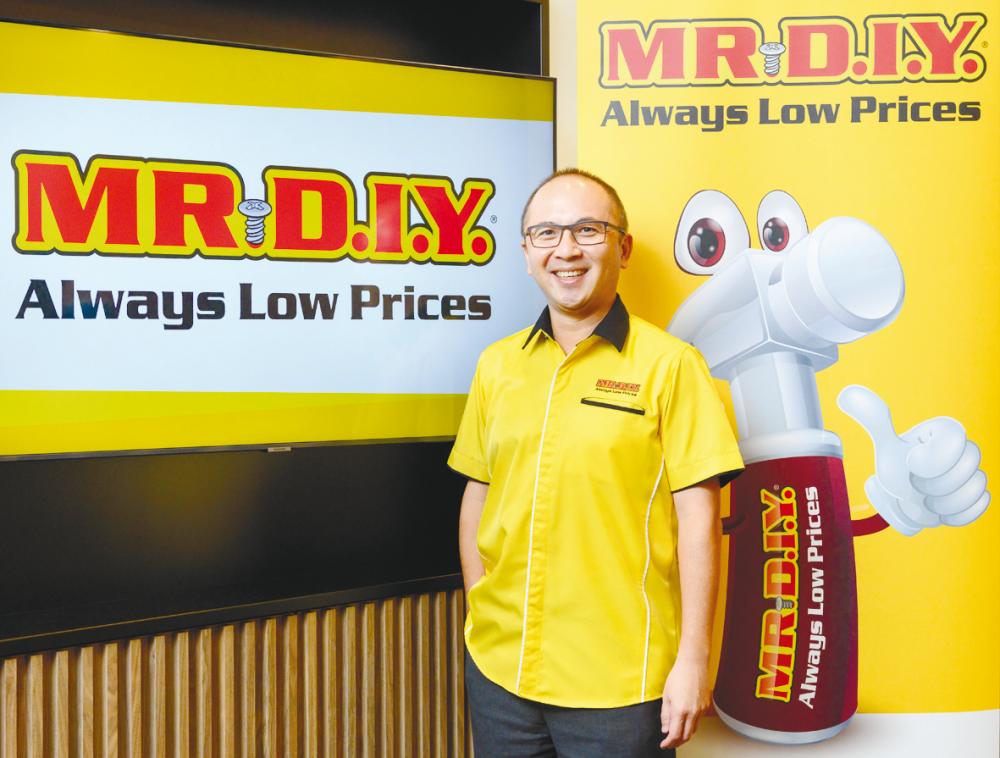PETALING JAYA: Home improvement products retailer Mr DIY Group (M) Bhd has 800 branches in Malaysia, more than post offices and any of the banks throughout the country, its CEO Adrian Ong (pix) states with pride, nailing this achievement down to its use of data analytics.
“We have a scientific formula behind everything we do. When it comes to new store openings, we focus on the (collected and analysed) data, including population and residential numbers, in site selection. We use the data to determine where to open a store, and curate that store offerings to match the population’s needs.
“For example, in a mid-size town, it may not be large enough for us to open a full Mr DIY store. We have stores in rural and suburban areas. Some of these communities may not be large enough to support a full-size store, (hence) we come out with Mr DIY Express, which operates in a small format of 2,000 to 4,000 sq ft, to serve the smaller community,” Ong told the audience at the MIDF Conversations webinar today.
He said data gathering and interpretation is the proprietary aspect of the company to help it make the right decision.
MIDF group managing director Datuk Charon Wardini Mokhzani said Mr DIY has proven that the Malaysian market is not small and many people underestimate the size of the local market.
“Mr DIY has three branches in Perlis, nobody has three branches in Perlis,” Charon quipped.
Ong said the company used data to tailor its inventory to stay relevant and focused, as well as bringing convenience and being close to the people in the neighbourhood.
He said data is used to determine the demand of a community and then it curates the store format and offerings to support that community, thus creating economic sustainability for the company.
“Products are offered in line with our slogan ‘Always Low Prices’ and we can do so by being able use our scale and data analytics to ensure that we curate for each store for the customers on a mass basis.
“We purchase products directly from manufacturers around the world, which results in us being able to offer competitive prices and the benefit of it is maintaining competitive prices.”
Ong said the contribution of e-commerce to the company’s revenue is small, at around 1%. The company focuses on operating brick-and-mortar stores, which is not an uncommon phenomenon for particular retailers worldwide.
“Although this type of retailing (strategy) is part of our branding, we have fully invested in e-commerce with one of the first fully dedicated robotics facilities in the country.
“We have one advantage in the e-commerce market, we have significant ability to offer omnichannel e-commerce called ‘click and collect’. The reason ‘click and collect’ is important is that we can save the cost of last-mile logistics (shipping fees),” Ong said.
He said the Covid-19 pandemic has changed the mindset of Malaysians as people learn to fix or do things on their own. The stay-at home order and the work-from-home practice are a boon to the company as electrical items demand has urged.
“Customer traffic has fallen during the pandemic as people stay home, I am confident that customer traffic will come back after the pandemic.
“Due to the pandemic, our customers are more purposeful when they come to our store; our average basket size has gone up between 20% and 30% from RM30 while we lost some customer traffic. Those who come to our store are more focused and buy more as they have planned to stay home more.”
Mr Toys and Mr Dollar, two brands launched by Mr DIY, are the results of its data-driven business strategy.
“Mr Dollar came about through our research on global fixed price retailing, which is a successful retailing method across the world. Many years ago, we did a road trip to review businesses on reasons that made them successful. We concluded that fixed price retailing is a good business model.
“If applied to the Malaysian environment, this model is much needed to support all communities. Fixed price retailing is a formula for us to keep prices low and to give customers confidence to walk into our stores knowing that the prices are fixed. Everything in the store is either RM5 or RM2.
“Mr Toys came about as we reviewed offerings in the country and we realised there was a need for affordable toys. It cost an individual an average of RM100 to buy a toy from a toy store in town. We use our sourcing network to enhance our offerings through Mr Toy to provide a new retail vertical that is missing here,” Ong said.









